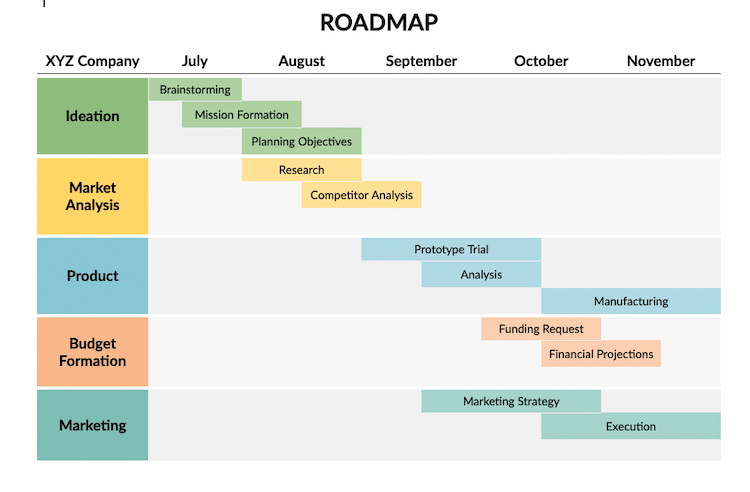Much to my amazement, product management jobs are a hot commodity, so rather than waiting until graduation, maybe securing a product manager internship is the right move for you.
In this article, we shall explore:
- The pros and cons of learning on the job and having prior domain experience.
- The different knowledge domains you will be dealing with.
- What do you do you in a typical product manager internship.

Product Management Is Hot
Being a product manager is a hot job, possibly because of the misconception that you are the “CEO” of the product (It’s more like you are an entrepreneur afraid of taking a risk, but more on that at another time), but more than likely it is due to the fact that product manager jobs are rarely boring as they are:
- An integral part of almost every organization,
- Cross-functional with many different departments from sales, support, marketing, so there is a large variety in your day to day work.
- Capable of having a visible impact on the business so you get to see your ideas come to life and experience the thrill of customer delight.
Product Management Internship: Skills
So, you still have your heard set on a product management internship? If so, the next question you might ask is “What do I need to know to get a product management internship?”
And this is where it get tricky as there are two schools of thought:
- The product management skills needed to succeed can only be taught on the job
- You need prior domain experience.
Before you dive deep into the world of product manager internships, you should take a moment to compare the product manager and product designer job role by reading our article,” Product Designer Vs Product Manager: What’s The Diff?” as many of the tasks you may consider to be part of product management are actually within the domain of product designers.
On The Job Training With A Product Management Internship
Despite what you may read in articles like this, I am not sure that you can come in to product management as a “tabula rasa“.
Do not get me wrong, I love the hustle this kid has, but I don’t think you can be successful in a product management role without some form of solid domain experience (and I speak to my own route into product management below) and dare I say work experience.

This is because you need to have some experience in managing workflow within a professional setting as a good part of the job involves coordinating the activities of other, which requires a certain stature within an organization.
If you do not have experience with the workflow of at least one of the specific domains that works with product management, obtaining the stature and gravitas with in an organization needed to coordinate the activities and deliverables of multiple domains as a product manager is going to be difficult.
This isn’t to say you should’t peruse a product management internship, but rather you should do so on the back of at least either some in depth education or early career work experience in a relevant domain so you have some basis from which to make prioritization decisions.
My Product Management Career Adventure
The TL;DR version – Don’t do what I did. Learn a related discipline first (design/engineering) and then move into product management. It provides you with leverage-able domain knowledge and structure and gives you a context against which you can compare experiences.
The Long Version: For the benefit of those considering a career in product management, I’ll put away my sanctimonious snark (or rather direct it at myself for a change) and give you a peek behind the curtain into the origin of my product management clusterfuck career, which speaks to the “on the job” learning path of product management.
Not having any formal training in software development (yet 2 graduate degrees), I’m one of those who fell into product management by default since I was too dumb to learn how to code properly and had a strong dislike for the “blow smoke up your ass” stereotypes associated with marketing (By the way, I was wrong about marketing stereotypes, well most of them anyways). Initially I figured most of tasks we now associated with product managers were done by either the software developers themselves, cuz they were super smart propeller heads, or by marketing managers.
The truth is, I didn’t realize that product management was a “thing” until about 10 years into my career and had constant trouble putting myself in a box by which I could describe myself professionally. In fact, I always felt insecure doing what you could probably call “product management” as I constantly thought that someone else could do what I was doing better as I seemed to be a jack of all trades, with a broad range of domain knowledge, but what I thought was very little depth.
I acquired the foundation of my product management skills when I launched my first ecommerce business at time when doing so was still challenging (Companies had just stopped putting about press releases about order and receiving their servers – I kid you not, people used to put out a press release that the Cisco server they ordered 6 months ago finally got delivered).
To a certain extent, I was unconsciously incompetent (Yes, I am more than open about my own incompetence) and assumed that software developers just magically figured out what products should look like. What I didn’t realize at the time is that you often need someone to translate between “marketing” and “developers” and this is where I found that product management fit in. But my lack of domain experience meant I sorely lacked an understanding of the importance of “workflow” and “process” in bringing a product to market. I had no context for my decision making process.
Back then, product management had a different name, well at least in my mind it had a different name, it was “Do what you need to do to launch a business”. Over time, I became familiar with gathering requirements, roadmaps, writing specs, fumbling through code (mostly perl and php), analytics, user acquisition as well as managing inventory, offshore manufacturing and other lessons I probably didn’t need to know.
The reality is that my progression into product management would have been much smoother with a prior grounding in a related domain as it would have provided insight in to workflow, processes and professional demands.
Prior Domain Experience
- Workflow
- Communications
- Expectation
Product Management Knowledge Domains
So regardless of your opinion of the ideal path into product management, a product manager internships exposes you to a range of knowledge domains, requiring a certain amount of mental gymnastics and intellectual horsepower to be successful.
The cliche amongst us might compare product management to being akin to a professional jackknife.

In order to communicate with and organize all of the requisite professional involved with bringing a product to market, you need to be comfortable with the following domains:
Data Management: You need understand the purpose of data in an organization, both as a product management tool and standalone product itself:
- Data as a product management tool: You will be exposed to the use of data from tools like surveys as well as website analytics and be required to extract insights in order to identify new business opportunities and help validate a product hypothesis or two.
- Data as a product: Certain products are build around offering specialized data to customers, so you need to understand how your users put this data to work .
Software Development: While product manager internships are not going to involve writing code, knowing how to code, especially if you’re working at a tech company, is an important tool for a number of reasons:
- Communication: It lets you communicate with software developers on their level.
- You don’t need to have them dumb things down for you because you understand things like object oriented programing, classes, variables, and recursions.
- It makes it harder for developers to bullshit you on why their deliverables are late or not to the specifications.
- Improved decision making: If you have written and deployed code before, you understand the process and the steps involved. You understand how to set up the infrastructure, push to Git and deal with bugs. This provides you with a level of professional empathy from which you can make good decisions.
Prototyping: While knowing how to prototype a product in something like Balsamiq or another tool is helpful, how much you will be required or even allowed to do it is a whole other matter.
- In product manager internships at smaller companies, you’ll probably have a fair amount of opportunities to work on prototypes, but at larger companies, they probably have dedicated product designers who handle prototype and will get pissed off is someone they probably see as unqualified start doing their jobs. In some environments, prototyping and wire framing are unnecessarily politicized, despite how helpful it is.
Product Design: Beyond prototyping, knowing the basics of the product design process will come in handy as there is a large amount of professional overlap and it some cases a product manager is expected to do both jobs
Customer Research: Bringing the right product to market means understanding and interacting with the unwashed masses customers in order to understand the needs, desires, pain points, and motivation.
Layered on top of this domain knowledge are you leadership, communication and collaboration skills. While as an intern, you are going to be hands on 95% of the time, it doesn’t mean you should neglect these other skills. Use an internship as an opportunity to find a mentor who is strong on the softer skills as these are not things you can learn from a book or class.
What Do You Do In a Product Manager Internship?
There is probably going to be a lot of grunt work and juggling
While some may say that a a product management intern does everything a product manager does minus the decision making responsibility, that is both glib and misguided but highlights the paradox we alluded to earlier when we said there were two schools of thought when it came to the skills you required.
Variables that determine what a product manager intern does:
- Size of company: At a certain level, what you are tasked with as a product manager depends on the size of the company you are interning for as we alluded to when compared product designers vs product managers. The larger the company you are interning for, the more you will probably be working on analysis for the product manager to use in making decisions. At a smaller company, you may be doing more hands on task that could fall into the realm of product design and UX.
- Stage of the Product Lifecycle:. The responsibilities mostly depend on what phase of development the product is in. One day you might working on market research; the next day, you find yourself collaborating with the UX team or engineers; and yet another day you’re interacting with marketing.

As a result, your tasking could involve any/all of the following:
- Market research and evaluate customer responses
- Product roadmap development
- Requirements gathering
- Assist product managers with hypothesis validation
- Facilitation communication between stakeholders
Conclusion: How To Find A Product Manager Internship
Most people will tell you, build a network, reach out to them, tell them what you are doing…blah blah blah.
Don’t waste your time doing that…yet.
If you are serious about getting into product management, the first thing you need is a reason why anyone would ever get back to you.
You need not to suck, you need to stand out.
Do this by building something. It could be something completely new or reworking of an existing product. If you read our article on how to write a product manager cover letter that doesn’t suck, you can see we are big fans of fully committing to the task at hand, entering with boldness and planning all the way to the end. If you really want to show you are into product management, create your own product and get experience and skills by doing.
At worst, you’ll be familiar with the challenges of building product and at best, you’ll be like “Fuck that noise…..I’m not getting a job, I’m gonna start a business!”
Building a product means:
- Identifying a market problem.
- Building a roadmap.
- Generating and validating a product hypothesis.
- Working with a developer to build an app
After you’ve done this, you will:
- Know if you really want to be a product manager
- Have something to show off during interviews.
Now its the time to follow the stereotypical job seeking advice:
- Build a solid network.
- Connect with your school alumni.
- Do some cold, but targeted outreach. My advice to you here diverges from the norms. Track down the CEO of a company you want to work for and get their contact info. Craft a concise message along the lines of your non crappy product manager cover letter demonstrating how you could help their company with specific examples from their existing products. Send it off and follow up with an email. You would be surprised how many CEO’s would be willing to talk to you about a job once you’ve demonstrated an interest in their business.






